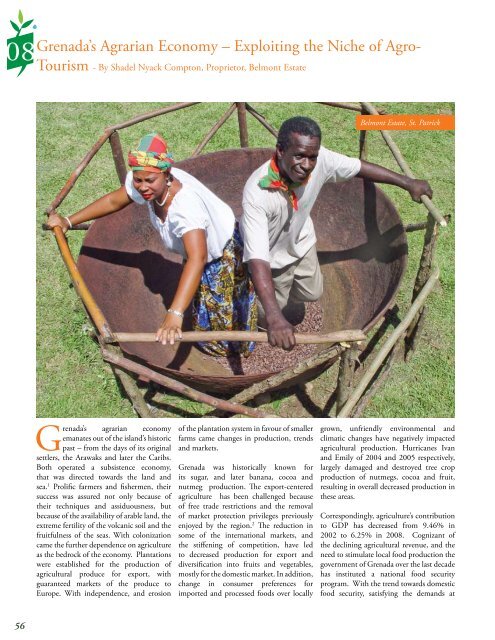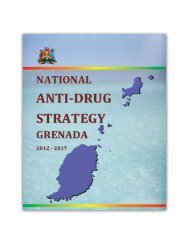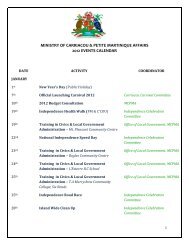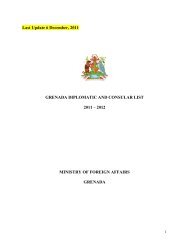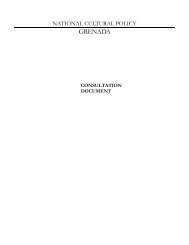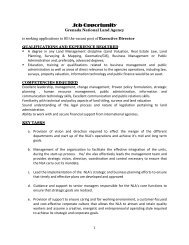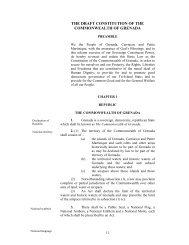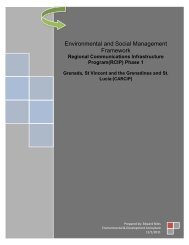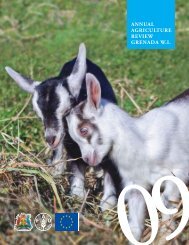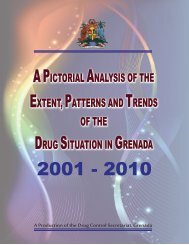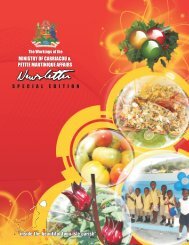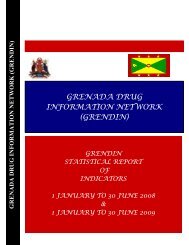Annual Agriculture Review 2008 - Government of Grenada
Annual Agriculture Review 2008 - Government of Grenada
Annual Agriculture Review 2008 - Government of Grenada
You also want an ePaper? Increase the reach of your titles
YUMPU automatically turns print PDFs into web optimized ePapers that Google loves.
<strong>Grenada</strong>’s Agrarian Economy – Exploiting the Niche <strong>of</strong> Agro-<br />
Tourism - By Shadel Nyack Compton, Proprietor, Belmont Estate<br />
Belmont Estate, St. Patrick<br />
<strong>Grenada</strong>’s agrarian economy<br />
emanates out <strong>of</strong> the island’s historic<br />
past – from the days <strong>of</strong> its original<br />
settlers, the Arawaks and later the Caribs.<br />
Both operated a subsistence economy,<br />
that was directed towards the land and<br />
sea. 1 Prolific farmers and fishermen, their<br />
success was assured not only because <strong>of</strong><br />
their techniques and assiduousness, but<br />
because <strong>of</strong> the availability <strong>of</strong> arable land, the<br />
extreme fertility <strong>of</strong> the volcanic soil and the<br />
fruitfulness <strong>of</strong> the seas. With colonization<br />
came the further dependence on agriculture<br />
as the bedrock <strong>of</strong> the economy. Plantations<br />
were established for the production <strong>of</strong><br />
agricultural produce for export, with<br />
guaranteed markets <strong>of</strong> the produce to<br />
Europe. With independence, and erosion<br />
<strong>of</strong> the plantation system in favour <strong>of</strong> smaller<br />
farms came changes in production, trends<br />
and markets.<br />
<strong>Grenada</strong> was historically known for<br />
its sugar, and later banana, cocoa and<br />
nutmeg production. The export-centered<br />
agriculture has been challenged because<br />
<strong>of</strong> free trade restrictions and the removal<br />
<strong>of</strong> market protection privileges previously<br />
enjoyed by the region. 2 The reduction in<br />
some <strong>of</strong> the international markets, and<br />
the stiffening <strong>of</strong> competition, have led<br />
to decreased production for export and<br />
diversification into fruits and vegetables,<br />
mostly for the domestic market. In addition,<br />
change in consumer preferences for<br />
imported and processed foods over locally<br />
grown, unfriendly environmental and<br />
climatic changes have negatively impacted<br />
agricultural production. Hurricanes Ivan<br />
and Emily <strong>of</strong> 2004 and 2005 respectively,<br />
largely damaged and destroyed tree crop<br />
production <strong>of</strong> nutmegs, cocoa and fruit,<br />
resulting in overall decreased production in<br />
these areas.<br />
Correspondingly, agriculture’s contribution<br />
to GDP has decreased from 9.46% in<br />
2002 to 6.25% in <strong>2008</strong>. Cognizant <strong>of</strong><br />
the declining agricultural revenue, and the<br />
need to stimulate local food production the<br />
government <strong>of</strong> <strong>Grenada</strong> over the last decade<br />
has instituted a national food security<br />
program. With the trend towards domestic<br />
food security, satisfying the demands at<br />
56


